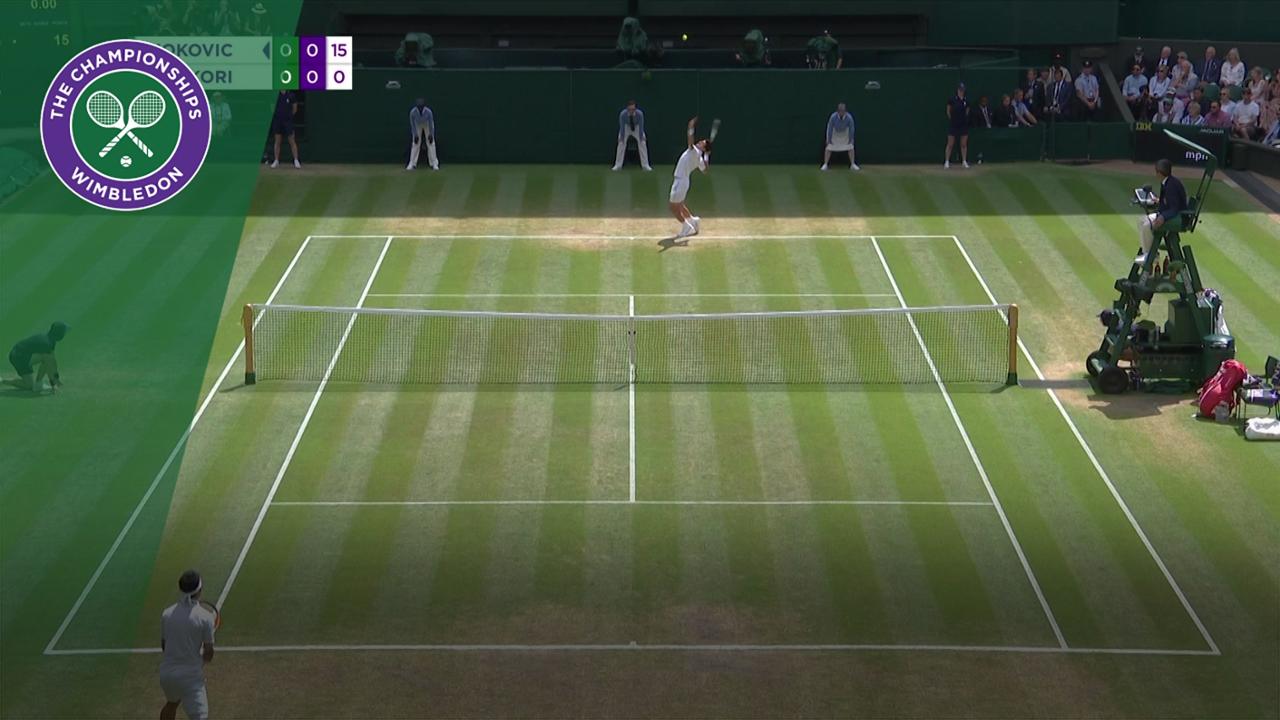New Djokovic emerges
This Fortnight hasn't so much seen the grass court resurgence of the old Novak Djokovic as the emergence of the new Novak, who is more animated, emotional and wide-eyed than in summers past.
Here at the All England Club's garden party, Djokovic is banging his fists on the trestle tables and it's wonderful to see. Clearly, Djokovic has never been an introvert, or someone who turns in on himself on Centre Court. But this year he seems to be in a particularly expressive and combative mood, and that approach took him through an entertaining four-set match against Japan's Kei Nishikori and into the Wimbledon semi-finals for the first time since 2015 - the year he won this title for the third occasion.
All the calm and joy that Djokovic felt earlier in the week when he took the Underground into the city with his wife Jelena, to celebrate their fourth wedding anniversary, dissipated on walking on to this rectangle of grass, where he was immediately in fight mode. Naturally, John McEnroe approves of Djokovic's "fire in the belly", with the New Yorker suggesting that anyone who runs into the Serb on the lawns ought to "watch out".
"It feels great to be in the last four of a Grand Slam. I feel like I'm peaking at the right moment," Djokovic said after a 6-3, 3-6, 6-2, 6-2 victory that carried him into his first Grand Slam semi-final since the 2016 US Open. He will play the winner of Rafael Nadal's match with Juan Martin del Potro.
As Andy Murray has observed, this is a "fired-up and motivated" Djokovic, who came through an excitable atmosphere in his third round against Britain's Kyle Edmund, and who was aggrieved early on in this match when the umpire gave him a code violation for bouncing his racket on the grass.
While there are notices all around the players' area reminding the competitors to take care of the turf, Djokovic suggested to the official that he hadn't damaged the surface. When Nishikori later did something similar with his racket and went unpunished, Djokovic made his point to the umpire: "Double standards, my friend".
"I thought it was unnecessary to get a warning [for bouncing his racket]. I didn't harm the grass. He didn't get a warning. It's not fair," said Djokovic, who was also reprimanded for taking too much time between points.
Winning Grand Slam quarter-finals used to be routine for Djokovic, but of late he has had some difficulties at this stage of a major, losing in the last eight of last season's Roland-Garros and Wimbledon, and again in Paris last month.
And with Nishikori playing the best grass court tennis of his life this Fortnight, there was a danger here of Djokovic losing a fourth successive major quarter-final. But that run ended and another sequence continued, Djokovic winning a 13th consecutive match against Nishikori.

Flexible
This contest between one of the fastest men on grass, Nishikori, and the bendiest, most flexible athlete at the All England Club - Djokovic - produced some compelling rallies. In one, Nishikori was ambling back towards the baseline, in the expectation that Djokovic's shot would loop long, when the ball dropped into court; in a state of some panic, the Japanese played a tweener and then, a moment later, a backhand winner.
Grass has traditionally been thought of as Nishikori's weakest surface. But this year, he made the last eight at the All England Club for the first time,becoming the first Japanese man in history to appear in the quarter-finals of all four Grand Slams. Along the way to the quarter-finals, Nishikori had beaten two of the most unpredictable men in tennis, with victories over Australian Nick Kyrgios and Latvian Ernests Gulbis. And he couldn't have been completely certain which Novak Djokovic he would encounter on Centre Court.
Soon he had his answer: an energised, engaged and ferociously competitive Djokovic.





